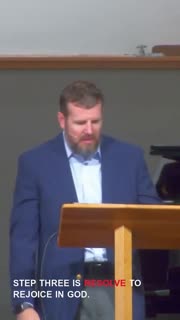Finding Joy Amid Sorrow: Trusting God's Sovereignty
Devotional
Sermon Summary
Bible Study Guide
Sermon Clips
1. "So when Jenny and I first prayed for Tim and Aileen, the first request that came to mind, is that they would respond like Christians. So that night his son died, that's what I prayed. And I was so relieved and grateful to read what Tim wrote on his website the next morning. He wrote, In all the years I've been writing, I've never had to type words more difficult, more devastating than these. Yesterday, the Lord called my son to himself, my dear son, my sweet son, my kind son, my godly son, my only son." [07:36] (43 seconds)
2. "We can do this. We don't want to do this, but we can do this, this sorrow, this grief, this devastation, because we know we don't have to do it in our own strength. Look what he writes next. We can do it like Christians, like a son and daughter, of the father who knows what it's like to lose a son." [08:30] (24 seconds)
3. "Joy and sorrow can coexist. There are still early days. These are still early days, but I do wonder if there's a certain height of joy that can really be understood or experienced only within or alongside a certain depth of sorrow. I don't know that yet. I don't have the life experience, but I am beginning to wonder. When I shared that with John Piper once, he's like, duh, that's totally true. So joy and sorrow can coexist. That's what this sermon is about." [11:14] (39 seconds)
4. "So it's easy to joyfully trust God when everything feels like it's going your way. But how can you joyfully trust God when you don't understand how God's way works? When your ways are just and good? How can you face the most challenging circumstances without falling apart, but instead happily trusting God?" [12:07] (23 seconds)
5. "So here, at the end of Habakkuk, he once again prays to God. This time, his closing prayer resolves the book. Here's what he says. Well, before he says that, there's a title that says, A Prayer of Habakkuk, the Prophet, According to Shigianoff. Now that short introduction bookends the closing line to signify that Habakkuk intends for this poetry to be put into song." [16:37] (36 seconds)
6. "Step two is think deeply about God, who he is, what he has done, what he will do. Think deeply about God, who he is, what he has done, and what he will do. A key passage in this book is chapter two, verse four, which says the righteous shall live by faith. And you have to ask, faith in what? Faith in God. So who is God? What's he like?" [18:52] (34 seconds)
7. "So how do you joyfully trust God when your life seems unfair? Step one is the easiest. We already looked at that. Speak to God honestly. Talk to him about the injustice you see and don't understand. Step two, verses 3 to 15, takes more work. A lot more work. It's to think deeply about God, who he is, what he's done, what he will do. He's supremely powerful and just." [28:27] (28 seconds)
8. "Step three is resolve to rejoice in God. Resolve to rejoice in God. In Habakkuk 1 and 2, there's this back and forth between Habakkuk and God, and now at the end of the book, the tension escalates and beautifully resolves. So verse 16 says, I hear and my body trembles. My stomach churned. My lips quiver with fear at the sound. Rottenness or decay enters into my bones. My legs tremble beneath me. My legs gave way beneath me. Yet I will quietly wait for the day of trouble to come upon people who invade us." [28:54] (45 seconds)
9. "Though the fig tree should not blossom, nor fruit, or you could translate that grapes, beyond the vines, I love grapes, the produce of the olive fail, and the fields yield or produce no food, the flock be cut off from the fold, so no sheep in the pen, and there be no herd or cattle in the stalls. Just pause right there. This is dire. Verse 17 is dire." [30:10] (29 seconds)
10. "Yet I will rejoice or exult or celebrate in the Lord. I will take joy, I will be joyful in the God of my salvation. God the Lord is my strength. He's my source of strength. He makes my feet like the deer's, as sure-footed as the deer. He makes me tread on my high places. So he enables me to walk on mountain heights. God, God will strengthen Habakkuk and enable him to survive difficult times just as a deer can skillfully walk on steep mountains without falling." [31:15] (40 seconds)
Ask a question about this sermon
2. "We can do this. We don't want to do this, but we can do this, this sorrow, this grief, this devastation, because we know we don't have to do it in our own strength. Look what he writes next. We can do it like Christians, like a son and daughter, of the father who knows what it's like to lose a son." [08:30] (24 seconds)
3. "Joy and sorrow can coexist. There are still early days. These are still early days, but I do wonder if there's a certain height of joy that can really be understood or experienced only within or alongside a certain depth of sorrow. I don't know that yet. I don't have the life experience, but I am beginning to wonder. When I shared that with John Piper once, he's like, duh, that's totally true. So joy and sorrow can coexist. That's what this sermon is about." [11:14] (39 seconds)
4. "So it's easy to joyfully trust God when everything feels like it's going your way. But how can you joyfully trust God when you don't understand how God's way works? When your ways are just and good? How can you face the most challenging circumstances without falling apart, but instead happily trusting God?" [12:07] (23 seconds)
5. "So here, at the end of Habakkuk, he once again prays to God. This time, his closing prayer resolves the book. Here's what he says. Well, before he says that, there's a title that says, A Prayer of Habakkuk, the Prophet, According to Shigianoff. Now that short introduction bookends the closing line to signify that Habakkuk intends for this poetry to be put into song." [16:37] (36 seconds)
6. "Step two is think deeply about God, who he is, what he has done, what he will do. Think deeply about God, who he is, what he has done, and what he will do. A key passage in this book is chapter two, verse four, which says the righteous shall live by faith. And you have to ask, faith in what? Faith in God. So who is God? What's he like?" [18:52] (34 seconds)
7. "So how do you joyfully trust God when your life seems unfair? Step one is the easiest. We already looked at that. Speak to God honestly. Talk to him about the injustice you see and don't understand. Step two, verses 3 to 15, takes more work. A lot more work. It's to think deeply about God, who he is, what he's done, what he will do. He's supremely powerful and just." [28:27] (28 seconds)
8. "Step three is resolve to rejoice in God. Resolve to rejoice in God. In Habakkuk 1 and 2, there's this back and forth between Habakkuk and God, and now at the end of the book, the tension escalates and beautifully resolves. So verse 16 says, I hear and my body trembles. My stomach churned. My lips quiver with fear at the sound. Rottenness or decay enters into my bones. My legs tremble beneath me. My legs gave way beneath me. Yet I will quietly wait for the day of trouble to come upon people who invade us." [28:54] (45 seconds)
9. "Though the fig tree should not blossom, nor fruit, or you could translate that grapes, beyond the vines, I love grapes, the produce of the olive fail, and the fields yield or produce no food, the flock be cut off from the fold, so no sheep in the pen, and there be no herd or cattle in the stalls. Just pause right there. This is dire. Verse 17 is dire." [30:10] (29 seconds)
10. "Yet I will rejoice or exult or celebrate in the Lord. I will take joy, I will be joyful in the God of my salvation. God the Lord is my strength. He's my source of strength. He makes my feet like the deer's, as sure-footed as the deer. He makes me tread on my high places. So he enables me to walk on mountain heights. God, God will strengthen Habakkuk and enable him to survive difficult times just as a deer can skillfully walk on steep mountains without falling." [31:15] (40 seconds)










